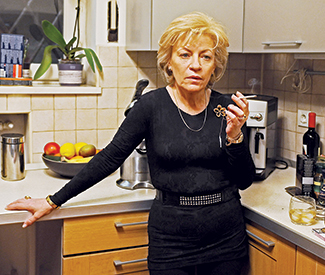FILM
Lots of big-budget English-language movies are made in Romania now, because it has good production facilities, flexibly “period” locations, and most importantly because it’s probably still a lot cheaper to shoot there than wherever your story is actually set (whether 17th-century France or even contemporary suburban America). But that trend started nearly a quarter century ago, when producers of low-rent horror movies (notably Full Moon, with its Subspecies and Puppetmaster series) realized they could film whole movies right where Dracula came from, for less than their LA catering budget.
That sort of thing continues today, and there’s even a Full Moon Festival that is the country’s only annual horror/sci-fi showcase. Yet in terms of actual Romanian movies, made by and (at least theoretically) for Romanians, horror has never gotten much of a foothold. The Romanian New Wave that began making waves internationally about a decade ago is as far from guilty pleasure genre terrain as possible, being heavy on the very long takes, cryptic narratives, and bleak realism of a particular, stratifying form of high art cinema. You could make a case for some being psychological horror stories, like Cristian Mungiu’s 2007 4 Months, 3 Weeks and 2 Days, the cheerful tale of two young women trying to get one illegal abortion amid the pro-life climate of the Ceausescu dictatorship.
At last, however, Romania has come up with its very own, original, terrifying monster movie. Yes, it is only psychological “horror,” replete with more long takes, cryptic narrative aspects, and bleak realism. But nothing has been quite as skin-crawling a filmic experience in a while as watching Luminita Gheorghiu as a Bucharest grande dame practicing her particular form of Machiavellian maternal concern in Child’s Pose. It’s a good thing Mother’s Day is still some weeks away, because here is a movie you will need to shake off before regarding your own “I carried you for nine months” claim-staker with anything but fear and loathing.
Cornelia Keneres (Gheorghiu) is introduced kvetching by phone to a friend about her son’s girlfriend — one who, being insufficiently Brahmin-born (among other things), she does not approve of. But you sense right away she wouldn’t approve of anyone who complicated her successful apron-string strangulation of said only child. She plumbs (and plies with unwanted secondhand-clothing gifts) their discomfited, shared housekeeper for every possible detail about what Barbu (Bogdan Dumitrache) has said and done of late. She clucks over the affairs of other people’s children with similarly well upholstered, upper-class Bucharest matrons you just know steered their families’ good fortunes with iron-butterfly will through the awkward transition from corrupt old Communist regime to brave new capitalist world. One such pal is a none-too-retired veteran opera diva who, while coaching two young singers in front of a small audience, can’t resist butting in on the junior soprano’s part repeatedly.
Cornelia is appreciating this spectacle — selfish, war-painted gorgons must stick together — when she gets an emergency call with some bad news. Her thirtysomething “boy,” driving recklessly on a country road, has hit and killed an actual boy. Swooping down like a mother hawk, she immediately sets about intimidating the local police and trying to revise the statement Barbu has already given them.
This might be a heartrending tale of sacrifice and love under tragic circumstances, if it weren’t for the fact that Cornelia is palpably a horrible, horrible person, and her son — who shows no signs of being much better — hates her guts. The child he killed is an inconvenient abstract for her, and one suspects what Barbu feels is less guilt than an all-consuming self-pity that this should happen to him. Jobless, hapless, and pampered, he’s the kind of terminal manboy who will never be able to make decisions of his own, or stop resenting his parents for making them on his behalf. (Actually dad, played by Florin Zamfirescu, has clearly long since given up on both of them in disgust.) He whines, he chafes in his mother’s presence. But notably, he doesn’t tell her to stop meddling, because he’s too weak to either save his own ass or accept the criminal punishment that would befall most people in his position. The line between love and control may blur between them, but it’s not about to be severed.
This Golden Bear winner by Calin Peter Netzer, who co-wrote it with Razvan Radulescu, is a bit over infatuated with handheld jerky-cam at first, a distracting aesthetic choice that does not heighten the immediacy of its mostly cold, conversational scenes. But Netzer (whose prior features, 2003’s Maria and 2009’s Medal of Honor, were well-received if little seen beyond the festival circuit) settles down after a while, his film’s impact gathering as the camera grows more and more still. There are chillingly well-realized tête-à-têtes between Cornelia and her Barbu’s well-intentioned, overmatched girlfriend (Ilinca Goia); Cornelia and a reptilian accident witness (Vlad Ivanov) she hopes to bribe into changing his testimony; then a blood-freezing standoff between Cornelia and Barbu himself.
Finally, she meets with the parents of the dead child, two “very simple people” whose desire for justice she tries every trick in the book to manipulate. It’s a bravura performance of grief, empathy, and desperation, such that Cornelia might even believe it herself. Like her bleached hair, the emotions she expresses have been inauthentic for so long she can no longer tell the difference. Recalling the mother monster in the Alien movies, she just does what she has to in order to protect offspring who probably won’t even be grateful. And like that ghoul, she has umpteen ways to eviscerate anyone who gets in the way. *
CHILD’S POSE opens Fri/21 in Bay Area theaters.

